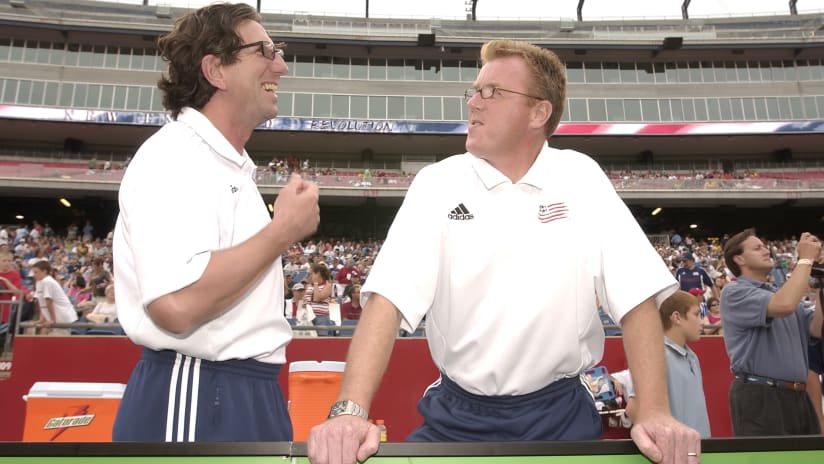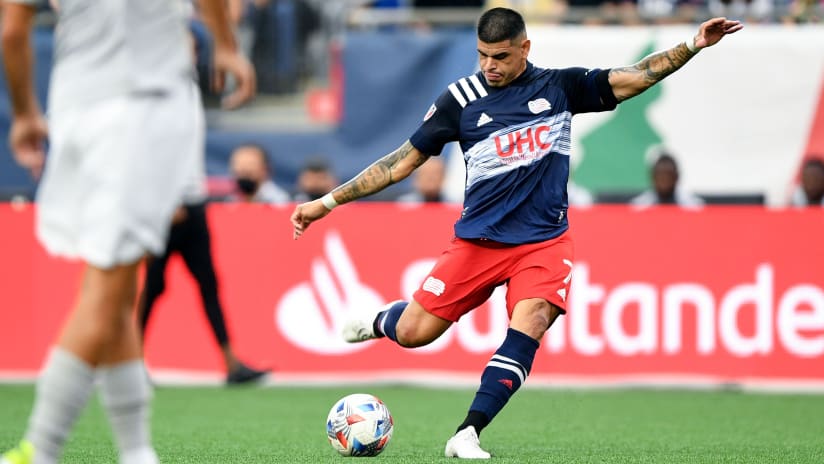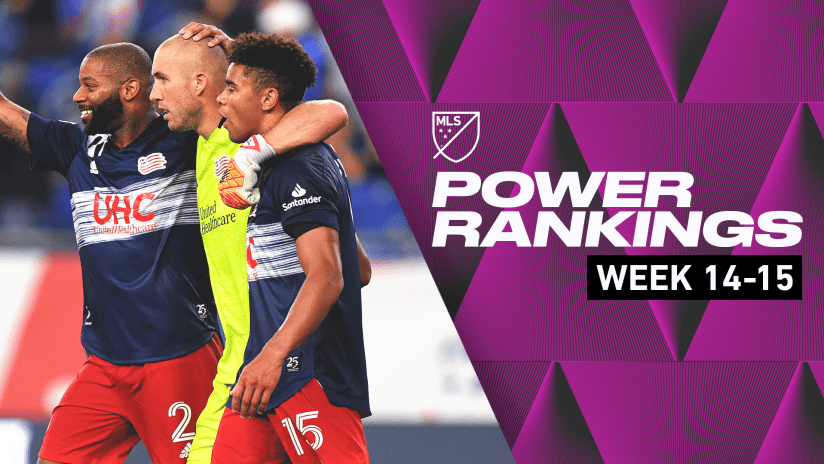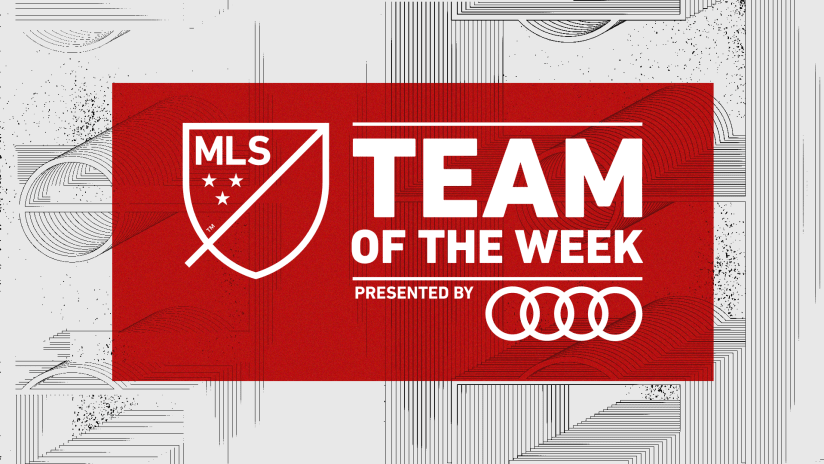If you’ve spent any time in or around the New England Revolution or the wider Boston-area soccer community over the past decade or two, chances are you’ve got a Paul Mariner story. Maybe a few.
Even the Patriots, the Revs’ NFL siblings down the hall, must’ve heard plenty of Mariner over the years, considering the way the genial Englishman lived life turned up to 11, to borrow a phrase from the heavy-metal world he also inhabited.
“Well, he only had one volume, and that was loud,” cracked former Revolution head coach Steve Nicol, Mariner’s old friend and onetime boss, to MLSsoccer.com. “The button was stuck.”
For longtime Revolution play-by-play commentator Brad Feldman, who shared the booth with him from 2014-19, that was just part and parcel of the Mariner experience. An old-school No. 9 during his distinguished playing career with the English national team, Ipswich Town and several other clubs across the globe, Mariner carried a presence few could eclipse.
“It's a very businesslike atmosphere for the most part at Gillette Stadium,” explained Feldman. “There were really only two people who could talk in the tunnel at the volume that he did: Willie McGinest, Hall of Fame linebacker, and Paul Mariner. Nobody else could get away with being as loud as those two guys. It was like their voices would sort of carry through the air ducts and fill the whole stadium on a non-gameday.
“Those guys, they were down by law, as they say. They had the reps and the chutzpah and the chops to do it and everybody wanted to hear what they had to say, so it was OK.”
On July 9 brain cancer claimed Mariner’s life, robbing both the English and North American games of a world-class player, coach, analyst and all-around icon. For family, friends, fans and colleagues around the world it’s both a gutting loss and a blessed relief for his pain, and also a chance to remember the hard-rocking effervescence of a human being who won even more hearts than he did trophies.
Mariner and Nicol led the Revolution to the most successful era of their existence so far, reaching three MLS Cup finals in three years between 2005 and 2007 and hoisting the U.S. Open Cup and SuperLiga trophies with a scrappy, tightly-knit squad and an egalitarian ethos. After stints at Toronto FC and his old club Plymouth Argyle, Mariner would return to Foxborough to grace their radio and television broadcasts as an insightful color commentator who also contributed to ESPNFC.
New England will pay tribute when they host CF Montréal at Gillette on Sunday evening, their first home match since his passing.
“Anyone who got to know Paul, whether it's someone who met him once on the sideline at a game, at a restaurant, at a bar, or someone like me who's known him for a decade, he just had an immediate influence on you in a very positive way,” said Revs president Brian Bilello, “and that just grew the more layers of Paul you got to know and the more you got to see him. He's very unlike just about anyone I've ever met in that regard.
“If you were a genuine, good person and a real person, then Paul had a lot of time for you.”
Though his Revs legacy is substantial, Mariner was already a legend when he crossed the Atlantic. He led Ipswich to FA Cup and UEFA Cup triumphs and spearheaded the Three Lions attack at the 1980 Euros and the 1982 World Cup, and experienced all the fame that accompanies that, which helped him befriend many of the rock stars whose music he loved to play – and often sing out loud – at the aforementioned high volume.
“He was big mates with Brian Johnson from AC/DC, Ian Gillan of Deep Purple, the guys in Iron Maiden, also Brian Howe, who was the singer for Bad Company for several years,” said Feldman. “And he had connections all throughout rock and roll, so that we got really good treatment – I ended up backstage at The Police and U2 because of Paul.
“Led Zeppelin, Deep Purple, Maiden, AC/DC, some Whitesnake: that was his soundtrack, and he also used to sing – constantly. To the point where if Nicol and I lost him in the airport, we would just say be quiet for a minute, and within 60 seconds you'd hear him singing, sometimes from 300 yards away, echoing through the concourse.”
Gwynne Williams served as New England’s goalkeepers coach from 2007-10 and shared an office with Mariner at Gillette, where he quickly got a glimpse of the former striker’s renown.
“I was amazed when I first got to the Revolution, how much fan mail Paul Mariner got on a daily basis – 25 years after he was finished playing,” said Williams, today a director of coaching at Virginia youth club Richmond Strikers. “And I'm not just talking one or two letters a week. I'm talking five or six letters a day, with parcels [asking], ‘will you sign this shirt and mail it back to me?’ Sign this, that or the other. And he never, ever refused. He always signed it and mailed it back.”
You wouldn’t know of his past fame by how he carried himself.
“No matter who you were, he made you feel like you mattered, and that your opinion mattered. As high up in the soccer world as he achieved, he really wasn't a person that was would hang that over you or disregard your opinion just because you hadn't scored goals in the World Cup,” recalled former Revs goalkeeper Matt Reis. “He was the complete opposite of that, very gracious and very humble.”
Mariner’s rocker friends would occasionally tag along to Revolution away matches or preseason camps just to enjoy his company.
“You'd go out to some of these road trips, especially in LA, or I think we had some of the guys show up in Bermuda,’ said Reis, “and they'd be dressed a little differently than everybody else, and you’d be like, ‘who is this geezer?’ And he would be like, ‘oh, this guy plays bass for Deep Purple’ or ‘this is my mate from Iron Maiden’ and you'd just hear these stories of these rock-and-roll superstars that he would know and hang out with.”
Williams also learned that one of Mariner’s quirks ensured everyone in the same room as him was a party to every single one of his telephone conversations. It’s a fitting tribute to Mariner that a workplace situation with such potential for annoyance turned out to be an evocative glimpse of his humanity.
“I never met anybody that ever had a bad word to say about him. He had such respect, and he was so humble. And he was also very loud,” explained Williams. “Paul never used to use the handsets on the phone. He used to talk to everybody just on speakerphone so he could walk around.
“Just to show you the measure of Paul, Bobby Robson was the manager that he played for at Ipswich. He was also the manager of the England national team when Paul first played for England. And sadly, Bobby Robson was ill with a brain tumor. Paul used to call Bobby Robson every week, just to check how he was doing, and quietly just inquire about his health,” he continued.
“And he did that for the best part of two years. So I'd be sitting at my desk in the office, just privy to his conversations with Bobby Robson. And then when Bobby was so ill that he couldn't get to the phone, Paul would still call every week and talk to Bobby's wife or his sons and he would get the updates.”
Mariner was also an avid joker and prankster. And while he professed a fondness for ‘keepers – “he always said if you want to have a good time, take a goalie with you; that was one of his mantras,” revealed Reis – goalkeeper coaches always seemed to bear the brunt of it.
“I’m pretty sure Gwynne was younger than Paul,” said Bilello with a smile, “but when they would go the bar after a game, Paul would always be like, ‘Budweiser, Stella and a glass of Chardonnay for my father here.’”
Said Williams: “Between him and Nicol, I had to have my wits about me every day and all day long … I can tell you that we laughed for hours every day.”
Mariner and Nicol once pulled a silly but effective training-ground gag on Williams’ predecessor David Vanole that left the two of them in stitches.
“Dino was an awesome guy,” said former Revs striker Taylor Twellman, “but he came in with a real bad case of gout. And I saw Paul and Stevie laughing like fourth graders, and I was like, what's going on? And they're like, look at Dino.
“David would walk in[to the locker room] and he was on one foot, it was bothering him so bad. They gave him a 9.5, but put the tag of an 11 shoe in his shoe. He’d be like, ‘Taylor, my gout feels fine, but I can't walk with these shoes.’”
Charismatic as he was, Mariner put in the work, too. He and Nicol established a jovial yet industrious culture and drove players ferociously when they believed it was necessary to draw out their best.
“You’ve got to have fun,” said Nicol. “You've got to enjoy coming in in the morning. And so that was the start of it. But then once we started training, then that was it, it was get down to work. So it was a dead-simple culture, enjoy yourself and work hard. And that's what we did.”
Noted Twellman: “Paul thought that they should have got rid of me, and he told that story all the time to anyone … He was like, Taylor’s s*, all he does is score goals, he does nothing else.”
But they eventually became fast friends. Twellman believes Mariner “changed his career” with his attention to the finer points of his striker’s toolkit.
“He was hard on me when he first came in – like, real hard,” said the Revolution’s all-time leading scorer. “He challenged me to do little things, and then we got into a real rhythm, whether it was 10 minutes of watching tape on certain runs that need to be cleaner when in hold-up play.
“He'd never touch anything in the final third, which I think is interesting when I reflect on it,” continued Twellman. “And when eventually we got close, I was like, why? He said, ‘why would I touch anything in the final third for you? Why would I do that? Everything about your game that's in the middle part of the field, you've got to clean it up so we can get your ass, and your big head, in the final 25 yards so we can win games.”
Mariner and Nicol weren’t the types to brag about their past playing exploits, though they did put their Revs charges in their place with a long-running tradition at practice.
“All the players used to love to challenge Paul and Steve to a game called Horseshoes, which is a game of precision and skill with a soccer ball,” said Williams. “And in the four years that I was there, no players ever beat them. When they would come back into the locker room, they had a big whiteboard and they would adjust the score that was written on the scoreboard: Mariner & Nicol 2,343 – they would wipe out the 2,343 and put 2,345 – Opposition 0. They loved to take the mickey out of all the players.”
Mariner collected enough wild tales – we haven’t even mentioned the time he got kicked out of a Van Morrison concert for making more noise than the main act – to pen an autobiography, “Paul Mariner: My Rock and Roll Football Story,” slated to hit shelves in October with a foreword written by Gillan.
His loved ones had hoped he would stave off his glioblastoma long enough to see it released. But that occasion, like Sunday’s homage, will provide another opportunity to remember the beautiful soul who lit up every room he entered.
“He was in pain. He was uncomfortable. He was not himself. So I'm choosing to celebrate Paul vs. being sad about what it is,” said Twellman.
“You could see with Paul, he would pal around with world-famous footballers and equipment managers in equal measure. It wasn't based on title or status, it was based on fondness and compatibility,” said Feldman.
“Mariner was larger than life, but it wasn't fake in any way. It was so pure, so genuine. One of his expressions was, ‘I take as I find.’ He judged people based on his feeling about them, the way they carry themselves, how genuine they were. It didn’t matter who they were.”













